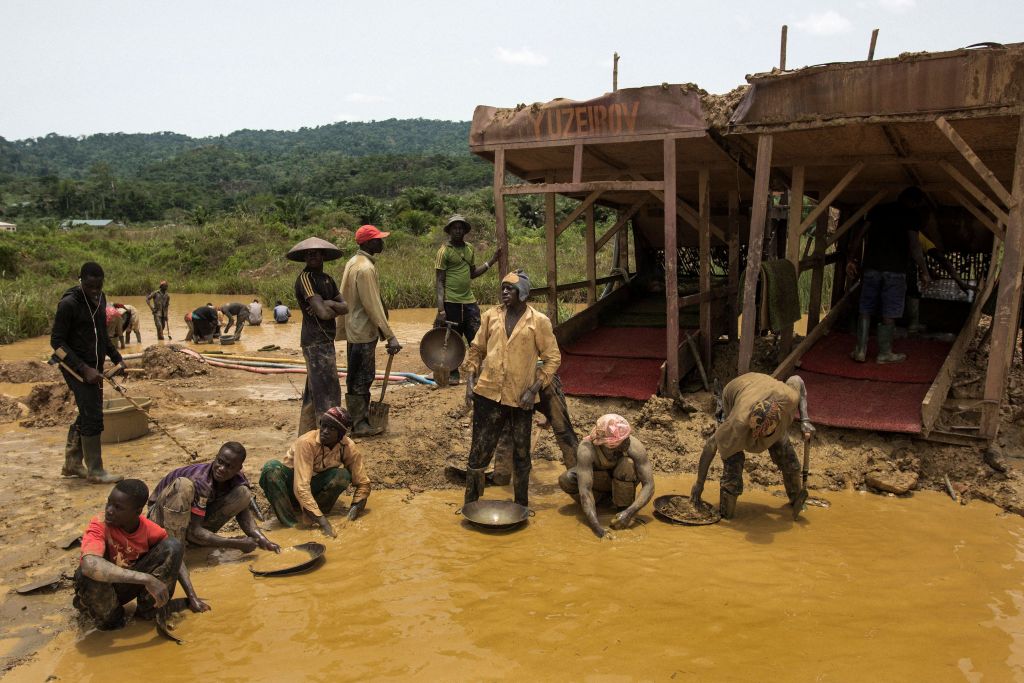ADF STAFF
Before it gained independence in 1957, Ghana was a British colony known as the Gold Coast. An old saying grew popular: “There is no land in Ghana which doesn’t have gold, even in the topsoil. Ghana is gold.”
Today, Ghana is the largest producer of gold on the continent and the sixth largest in the world, but it is struggling to address widespread illegal gold mining, called “galamsey” by locals, who say it pollutes the country and threatens the economy.
Ghanaian miners used to extract gold from shallow depths using shovels, picks, pans and their hands. Today, galamseyers often use Chinese-supplied excavators and bulldozers to churn up riverbeds and farms.
“Chinese entrepreneurs have driven much of the recent surge by partnering with local leaders and, in some cases, providing sophisticated digging machinery,” journalist Alexis Akwagyiram reported for Semafor media.
Driven by a historic rise in international gold prices, galamsey’s popularity has soared while the resource-rich country has struggled to curb mounting inflation and unemployment. Many turn to illegal gold-mining syndicates that offer up to 2,000 cedis ($125) a week.
According to Ghana’s mining sector regulator, small-scale operations produced 1.2 million ounces of gold in the first seven months of 2024, more than the 2023 total. But most of the spoils of galamsey are smuggled out of the country and aren’t counted as export revenues.
Hundreds protested in Accra in September and October 2024 to warn of galamsey’s devastating environmental impacts.
WaterAid, an international charity with at least 10 projects in Ghana and an office in Accra, urged the government to take “immediate action to end the ecocide,” while the national water utility warned that Ghana is at risk of needing to import water by 2030 if illegal mining is not restricted.
Dr. George Manful, a former senior official in Ghana’s Environmental Protection Agency, warned that Chinese-led mining operations typically use chemicals such as mercury, cyanide and nitric acid to separate gold particles from sediment before dumping their waste in rivers. These chemicals harm the entire food chain, he said, as they accumulate in fish and in crops irrigated with polluted water.
“Mercury can remain in water for up to 1,000 years,” he told Ghanaian radio station Joy FM. “The water in these rivers is so turbid that it is undrinkable. We are slowly poisoning ourselves.”
Health professionals in September issued a statement urging the government to ban galamsey.
“The rise in cases of respiratory illnesses, skin infections and waterborne diseases such as cholera and diarrhea in these communities is a direct consequence of the unchecked mining activities,” they wrote. “We are witnessing an ecological disaster with direct implications for human health, and this must be addressed with urgency.”
Economist and researcher Enoch Randy Aikins also is calling for a ban on all mining, specifically around water bodies and forest reserves.
“Government commitment is vital,” he wrote in a September article for the South Africa-based Institute for Security Studies. “An independent, non-partisan commission is needed to probe all mining companies’ leases, permits and activities to ensure their operations are legal. Transgressors must be swiftly prosecuted to demonstrate the government’s intent.”
Illegal mining has affected seven of Ghana’s 16 regions and 34 of the country’s 288 forest reserves, according to John Allotey, head of the Ghana Forestry Commission.
“We want to intensify surveillance, use the military to conduct operations in sensitive areas and find additional funding,” he said at an August 13, 2024, news conference in Accra.
With Operation Halt, Operation Vanguard and Operation Flush Out, the government has deployed the Ghana Armed Forces to curb galamsey, but miners always return quickly, sometimes within hours, to dismantled sites.
The government also has cracked down on Chinese immigrants. Attorney General and Minister for Justice Godfred Yeboah Dame said in September 2024 that 76 people, including 18 foreign nationals, have been convicted of illegal mining since August 2021, and more than 850 others are being prosecuted.
Chinese Ambassador Tong Defa on September 12, 2024, called on Chinese immigrants to stay away from illegal mining and for the Ghanaian government to prosecute those who don’t.
But the drivers and root causes of galamsey remain.
“Between 2008 and 2016, more than 50,000 Chinese citizens migrated to Ghana to mine gold on small-scale concessions,” researcher Heidi Hausermann wrote in a 2020 report in the journal Human Geography. “This is particularly surprising given that small-scale mining is an activity reserved for Ghanaian citizens.”
Kwame Amoah, a miner in Wasa in the Western region, said he is frustrated with Ghana’s laws on small-scale mining, which was legalized in 1989 but explicitly forbade foreign involvement.
“I’m pleading with the government,” he said in October 2024, according to GhanaWeb. “It shouldn’t be that someone from China is benefiting more easily while a Ghanaian is arrested for the same thing.”

